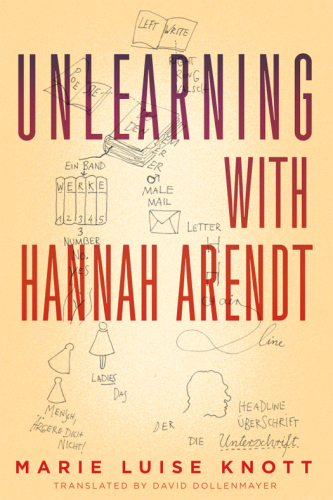
Unlearning with Hannah Arendt
کتاب های مرتبط
- اطلاعات
- نقد و بررسی
- دیدگاه کاربران
نقد و بررسی

July 21, 2014
German political theorist Hannah Arendt (1906â1975) took the philosophical line of questioning to the extreme when she advised that we not just question, but unlearn what we know. Journalist and translator Knott focuses on four concepts Arendt extensively unlearnedâlaughter, translation, forgiveness, and dramatizationâdrawing on her books, essays, and conversations and correspondence with other thinkers of the time. Through unlearning with Arendt, laughter transforms from a reaction to a comical situation to a way of identifying absurdity, evil, or serious matters. Forgiveness becomes a necessary path to the future instead of a mere forgetting of the past. Language proves to be limiting, especially when rebuilding politics or law with imprecise terminology. But Arendt's bilingual life, alternating between English and German, identifies the strengths and weaknesses of each. Intent on showing Arendt's words to be re-readable and re-learnable, Knott does the same with her own overview of Arendt's reeducation.

March 15, 2014
Hannah Arendt (1906...75) is forever associated with her perplexity over the banality of evil in which seemingly ordinary people can reduce the systematic destruction of millions to a routine no more troubling to them than the slaughter of fish to a fishmonger. The "unlearning" of Knott's title is the break with culture and tradition imposed on Arendt by exile, the philosopher's need to express herself in a new language and to find a new perspective on history. Arendt struggled with ideas of forgiveness and explored new ways of putting distance between herself and horror, a distance the author associates with laughter. Knott, the founder and editor of the German edition of Le Monde Diplomatique, addresses the same audience as Margarethe von Trotta's 2012 film Hannah Arendt. Both miss the other side of Arendt--the search for a central tradition with which to grasp the human condition that attracted her to Karl Jaspers and lay behind her 1996 thesis "Love and St. Augustine," which is absent from the bibliography. VERDICT This book is charmingly written, carefully translated, and easy for ordinary readers--but it makes Arendt sound too much like Jean-Paul Sartre and we should be a little wary.--Leslie Armour, Dominican Univ. Coll., Ottawa, Ont.
Copyright 2014 Library Journal, LLC Used with permission.

April 15, 2014
Despite her famous allergy to being called a philosopher, Hannah Arendt is today considered one of the more important political philosophers of the twentieth century, in particular for her thoughtful grappling with some of the core moral, political, and social dilemmas posed by the occurrence of the Holocaust. Although considerable scholarly attention has been dedicated to her philosophical arguments, some of which continue to be subjects of robust debate, her philosophical method has been less of a focus. With this selection, German journalist and Arendt scholar Knott zooms in on the pathways that Arendt followed in breaking free from the biases and limitations of her intellectual predecessors. The key concept is verlernen, translated as unlearning: the rejection of instruments of comprehension that have proved dull or irrelevant so that we can argue about and conquer them anew. In essays on four of Arendt's techniques for unlearninglaughter, translation, forgiveness, and dramatizationKnott presents an uncommonly intimate look at the philosopher's intellectual processes. Readers seeking criticism of Arendt's methods or conclusions won't find it here, but those who share Knott's reverence for Arendt will luxuriate in this selection.(Reprinted with permission of Booklist, copyright 2014, American Library Association.)

























دیدگاه کاربران